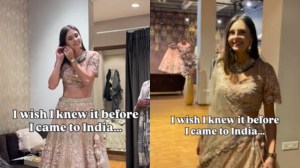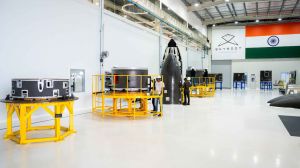I see what goes on (in Parliament). It sometimes worries me
President Pratibha Patil speaks on a range of issuesfrom controversies to achievements.
Pratibha Patil was a surprise for the job five years ago. Her election was made possible as the Left blocked Shivraj Patil for the job,insisting on a woman candidate. The NDA contested then,with Vice President Bhairon Singh Shekhawat standing but losing to Pratibha Patil heavily,as the UNPA abstained from voting. Those close to her say that after 1996,when she completed her Lok Sabha term as an MP from Madhya Pradesh,this Congress loyalist never wanted to fight again and then,even the governorship of Rajasthan came as a surprise. She served there for two years,till she was elected President by UPA-I.
Patil started life as a lawyer in a district court in Jalgaon,and went on to become an MLA at 27. From then to 1996,she has never lost an election. She has served in not just the Vidhan Sabha,but also Rajya Sabha,also as Deputy Chairman and then in the Lok Sabha. According to political observers,she even came close to becoming the Chief Minister of Maharashtra in her heydeys but her candidature was shot down at the last minute.
Patil has made it clear she is not and never has been interested in a second term. It has been a tough act to follow as APJ Abdul Kalams successor,especially as Kalam could project himself successfully as a Peoples President,a definition that meant different things to different people. On her part,Pratibha Patil has tried to follow her passions and hopes to leave a distinctive stamp. Her tenure has also been marked by controversies,not just over her proposed retirement house in Pune,but also over her familys political ambitions and now even over the money spent on her foreign trips,amounting to Rs 205 crore,as revealed by RTI applications.
Despite the controversies,Patil has remained guided by her own priorities. Recently,while addressing business associations,she went off script and spoke at length about farmers to industrialists,elaborating about how they were entrepreneurs too and understated ones,operating intelligently in a very risky environment. Their well-being,she said,was a key component of the India story.
In an interview to The Sunday Express,Patil spoke on several issues on the eve of her last visit as head of the Indian state,to Seychelles and South Africa.
As Indias first woman President,what was the challenge like?
I can best describe it as interesting. I took it in my stride. It has been about keeping to my constitutional responsibilities and performing my duties. This year,I complete 50 years in public life,and ever since I was elected as an MLA at 27,I have been involved in and committed to women and child welfare.
But specifically,your being a woman,how did that play out now?
I was wondering initially how this stint would be different because I am a woman,but I received a lot of respect and cooperation from all quarters. My experience in the Vidhan Sabha,Lok Sabha,Rajya Sabha,then as Deputy Chairperson of the Rajya Sabha and then as a Governor came in handy and helped me deal with the situation,I suppose. Also,having studied law was very beneficial for such a constitutional post. But what I learnt as a peoples representative at the grassroots was key to developing and guiding me. As an albeit junior minister in Maharashtra,in the seventies,during the Congress Partys Garibi Hatao campaign,I used to tour the districts,alongwith the collectors and officials and tried to see everything first hand. We instituted a scarcity work programme and wages doubled,with wives of labourers also being given work. While 50 per cent of people spent their money fruitfully and sensibly,I realised that a significant number were simply wasting their incomes in addictions like gambling and drinking. This was at a time of drought when even land owners were working as labourers. Since then I realised that eradication of addictions of all kinds is the key,and education was not enough,it needed social change,enlightenment to spread. That was an eye-opener,that removal of social evils and ills is the key to any change we may expect in our circumstances,since it was not the case of individual addiction but mass-scale addiction which had affected the well-being of the people. I realised that if we want to bring people above the poverty line,they should be made free of this type of addiction which made them physically and financially weak.
What have you done specifically to open up Rashtrapati Bhavan to the people?
I have always made it clear that Rashtrapati Bhavan does not belong to me,or to any President,but it is of the people. Its the property of the people,the citizens of India. Some boys and girls from Kashmir came recently,and I told them very clearly this is yours and of all the people of India,as Kashmir is Indias and belongs to you and to us. (This visit was part of Operation Sadbhavna). Its important that no one feels alienated and these things help to know that India is a real democracy.
You have tried to push some things close to your heart through the Governors Conferences and Reports. How has that worked out?
We have had two Governors Conferences,one in 2008 and the other in 2011. In the first,I felt it was my duty to address the status of women so there was an elaborate exercise under the stewardship of then Governor AR Kidwai,and the Report called for a National Mission,not a committee or anything,but a constitution of the Mission and more funds for the cause. The recommendations of the committee were accepted by the government and that resulted in the constitution of National Mission for Empowerment of Women (NMEW) in March 2010 with the Ministry of Women and Child Development as the nodal ministry. As recommended by the Governors Conference,a high-level committee to study the status of women under the chairpersonship of Justice Ruma Pal has also been set up and the process of revamping of the Rashtriya Mahila Kosh is on. I am happy to say that the functioning of the Mission has kicked off,and in the states also such institutions are coming up as was envisaged. The fact of an overarching idea like the National Mission has helped pull things together under a large policy umbrella through convergence not just implementation of schemes. Hopefully,it will gather momentum in a few more years.
The second Governors Conference,under Governor Shivraj Patil,focused on problems of increasing productivity in dryland and rain-fed areas. We had a workshop at Rashtrapati Bhavan on policy initiatives for promoting partnership between stakeholders in agriculture with particular reference to rain-fed/dryland farming which was very helpful in bringing together all the stakeholders on the same platform and hear their viewpoints and concerns. We are hoping that the report will come in soon,and the farmer,as much as an entrepreneur and risk-taker as any industrialist,will be helped by what emerges. So,I have done my bit,with trying to help women and farmers both.
You said early in your tenure that you did not see the President of Indias job as that of a rubber stamp. What did that mean?
Its not just the executive that is important in a democracy,but Parliament,and the President and both the Houses of Parliament constitute the idea of the House. So the President is not just a mere rubber stamp but needs to oversee things.
What do you think about what you see in Parliament?
I see what goes on,which sometimes worries me. But it is imperative that all of us think of the nation. Governments and presidents will come and go but the nation has to survive and be strong. All political parties have to be strong and help build a strong nation.
Are you hopeful they will,in the circumstances?
Yes,I am hopeful.
You are also the Supreme Commander of the armed forces. In recent times,there has been much talk of friction between the head of the armed forces and the government. There was even the incident reported by The Indian Express about happenings in January this year that was worrying. What did you think?
I thought this was something that should not have happened. It should have been handled in a disciplined manner. I was concerned. I dont wish to say anything more on the subject.
The controversies have erupted at times. You are embarking on a trip to Seychelles and South Africa. There are RTI revelations about the amount spent on the trips. Does that worry you?
What worries,disturbs and pains me is that people dont always verify facts. The President doesnt make visits on her or his own. These are done at the behest of the government and in close coordination with them. This is a part of the foreign policy initiative of the government and about Indias image. No head of state has visited Seychelles,a key and strategic place in the past 23 years. This is my last tour as President. Is this wrong?
Any thoughts on your successor? What qualities should s/he possess?
How can I say? But yes,mental poise and presence of mind under many trying circumstances that s/he will have to face.
There is talk in some quarters of having a non-political President. How will that work in your opinion?
No comments.
The President decides on mercy pleas of those sentenced to death. Your thoughts on this role and the death penalty?
I cant comment on this as I am looking at things. The death penalty is part of our Constitution,but reserved for the rarest of the rare.
Any regrets or unfinished business as you reach the end of your term?
No regrets at all. And unfinished business? Well,I am very keen on the Second Governors Conference Report on dryland irrigation. I am eagerly awaiting that. I am thankful to the people of India for this unique opportunity to serve them with all humility and a sense of service.
- 01
- 02
- 03
- 04
- 05































